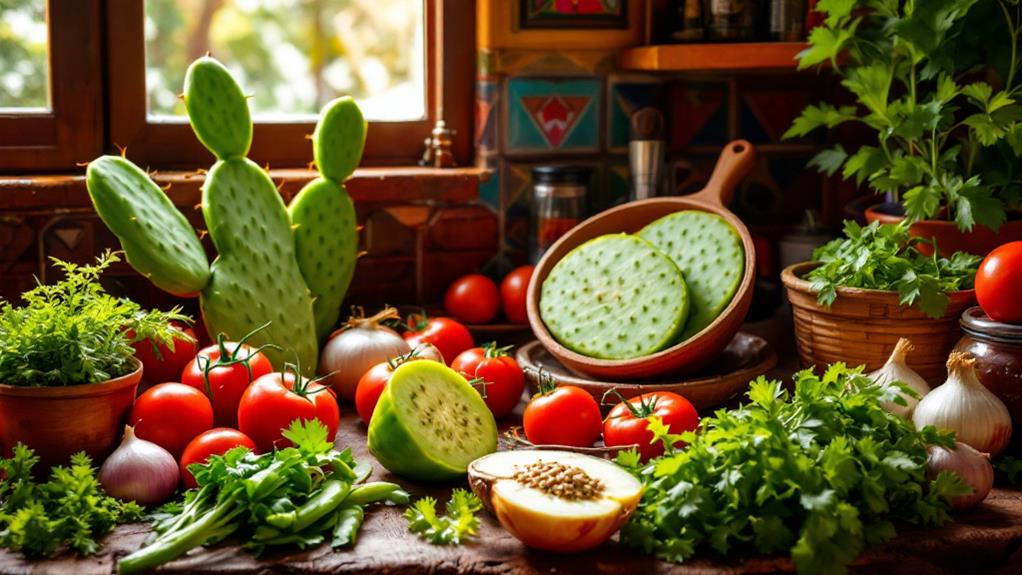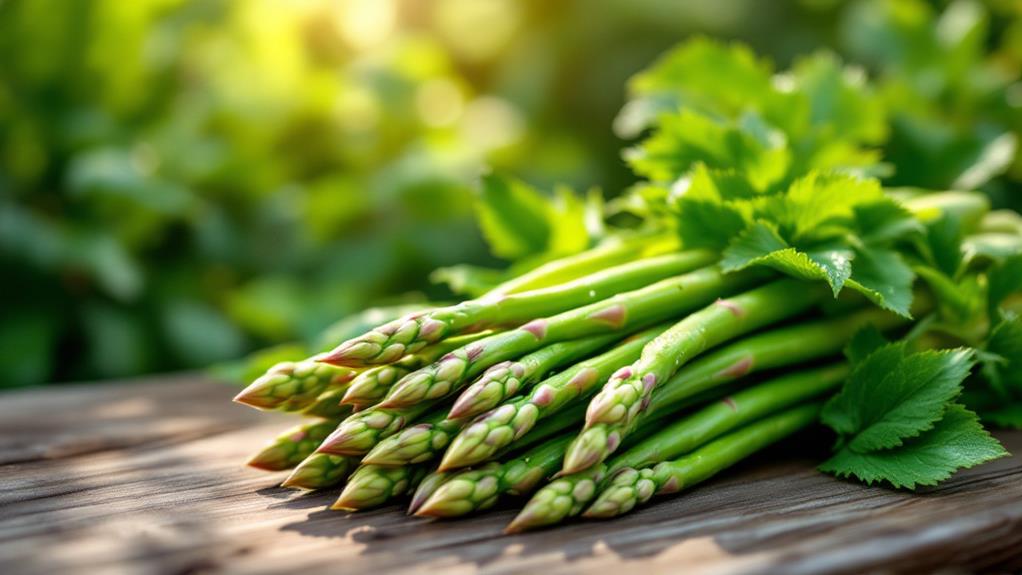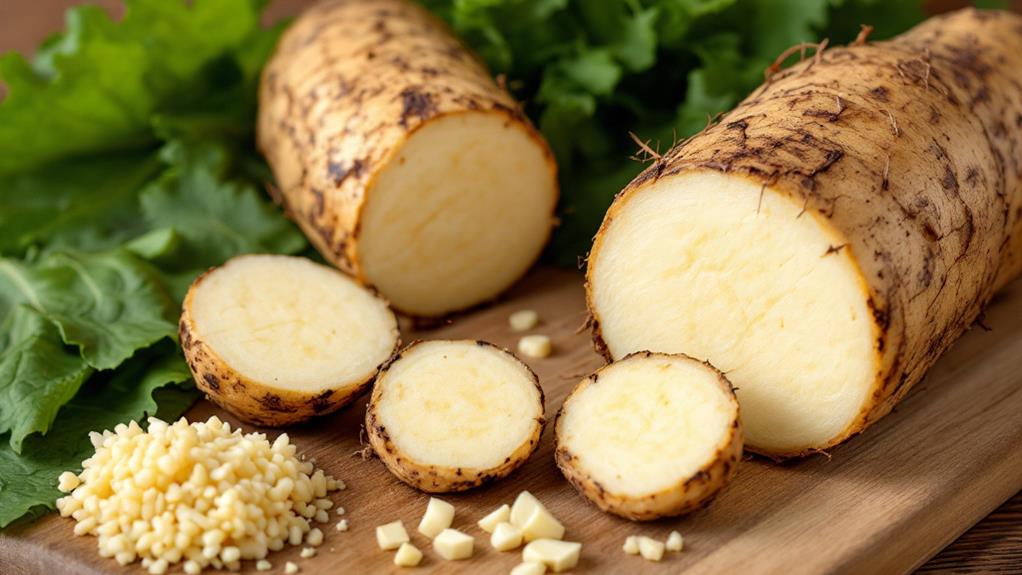Everything You Need to Know About Leeks: Health Benefits, Uses, and Growing Tips
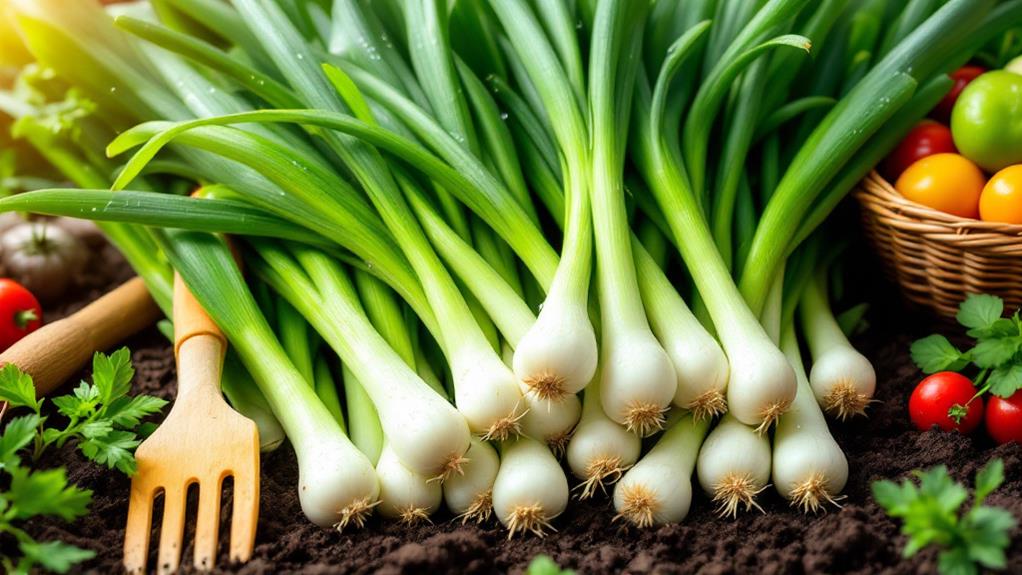
Leeks are a low-calorie, nutritious powerhouse rich in vitamins like K, A, C, and folate, packed with fiber, and loaded with antioxidants to promote overall wellness. You can add them to salads, soups, and stews for a mild onion flavor, or pair them with potatoes for creamy dishes. To grow leeks, plant them in early spring or late summer in well-drained soil, keeping them six inches apart and watered weekly. While beneficial, leeks can cause digestive issues for some, so it's good to start slow. Ready to investigate more about leeks and their surprising benefits? There's much more to uncover.
Nutritional Benefits of Leeks
In the domain of adding a healthy and low-calorie vegetable to your diet, leeks are an excellent choice. With only 31 calories per 100 grams, leeks are perfect for weight management. They're packed with fundamental vitamins like Vitamin K, Vitamin A, Vitamin C, and folate, which support diverse body functions. These vitamins contribute to your comprehensive health and provide substantial health benefits.
Leeks are also rich in dietary fiber, promoting digestive health and helping you feel full longer. This makes them a great ally in maintaining or achieving a healthy weight. The high fiber content not only aids digestion but also supports weight management by curbing overeating.
Moreover, leeks are loaded with antioxidants, such as flavonoids and carotenoids, which combat oxidative stress. These antioxidants are known to lower the risk of chronic diseases, including certain types of cancer. By incorporating leeks into your diet, you can bolster your body's defenses against these health challenges.
Furthermore, leeks supply fundamental minerals like manganese, iron, and calcium, further enhancing your well-being. These minerals play a significant role in maintaining strong bones, healthy blood, and general vitality. Welcome leeks as a nutritious, weight-friendly supplement to your diet.
Culinary Uses and Recipes
Leeks, with their impressive nutritional profile, aren't just a powerhouse of health benefits—they also shine in the kitchen. Their culinary uses are vast, and their versatility is unmatched. For a fresh twist, try adding thinly sliced leeks to your salads. They provide a mild onion flavor and a satisfying crunch. When sautéed, leeks transform into tender, sweet bites, perfect as a base for soups, stews, and risottos. Imagine the aroma wafting through your kitchen as they improve your dishes' overall taste profiles.
Their compatibility with potatoes is another reason to love leeks. Mixing them into mashed potatoes creates a rich, creamy dish that highlights their subtle sweetness. And don't forget vichyssoise, the classic cold potato and leek soup that showcases leeks' ability to shine in both hot and cold recipes.
Even the tough green tops of leeks have their place in the kitchen. Use them to impart deep flavors into your stocks and broths, ensuring nothing goes to waste. Leeks invite creativity, and here are three ways they evoke joy in cooking:
- Transform your soups with sautéed leeks.
- Raise mashed potatoes.
- Create flavorful stocks.
Growing Leeks at Home
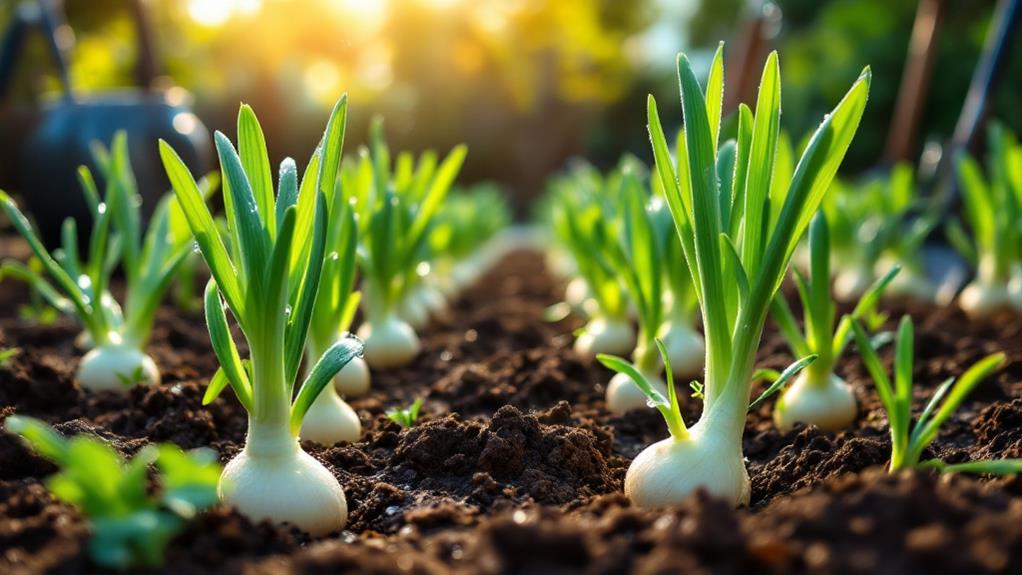
Growing your own leeks at home can be a rewarding experience, offering fresh ingredients right from your garden. To get started with growing leeks, plant them in early spring or late summer. They thrive in well-drained soil rich in organic matter, with a pH range of 6.0 to 7.0. This guarantees the leeks have the nutrients they need to grow strong, healthy stems. Space leeks about 6 to 8 inches apart to allow enough room for their cylindrical shape and to promote proper air circulation.
Regular watering is essential, as leeks require about 1 inch of water each week. This is particularly significant during dry spells to prevent bolting and keep the leeks tender. For the best results, practice blanching by hilling the soil around the leeks as they grow. This involves covering the lower leaves to encourage those long, white stems you're after.
When it's time to harvest, wait until the leeks reach about 1 inch in diameter. Gently loosen the soil with a fork or spade to avoid damaging the roots. Enjoy the health benefits of these low-calorie, home-grown leeks in a variety of dishes, enhancing your home gardening experience.
Potential Health Risks
While home-grown leeks offer numerous benefits, it is vital to be aware of certain health risks they may pose. To begin with, leeks are high in FODMAPs, which can trigger digestive issues like bloating, gas, and diarrhea, especially if you have sensitivities or irritable bowel syndrome (IBS). Furthermore, the high fiber content in leeks might lead to gastrointestinal discomfort if you're not used to a high-fiber diet. Moderation is key to avoiding these issues.
Leeks can also cause allergic reactions in some people. If you have sensitivities to the Allium family, including garlic or onions, you should be cautious. Symptoms such as contact dermatitis or other skin irritations may occur, so it is prudent to monitor your body's response when trying leeks for the initial time.
Moreover, if you're on blood thinners, the vitamin K in leeks can interfere with medication. This could potentially affect blood clotting, so it is important to consult your doctor before adding significant amounts of leeks to your diet.
Here are three risks to keep in mind:
- Digestive issues from FODMAPs
- Allergic reactions to the Allium family
- Interactions with blood thinners due to vitamin K
Research and Studies
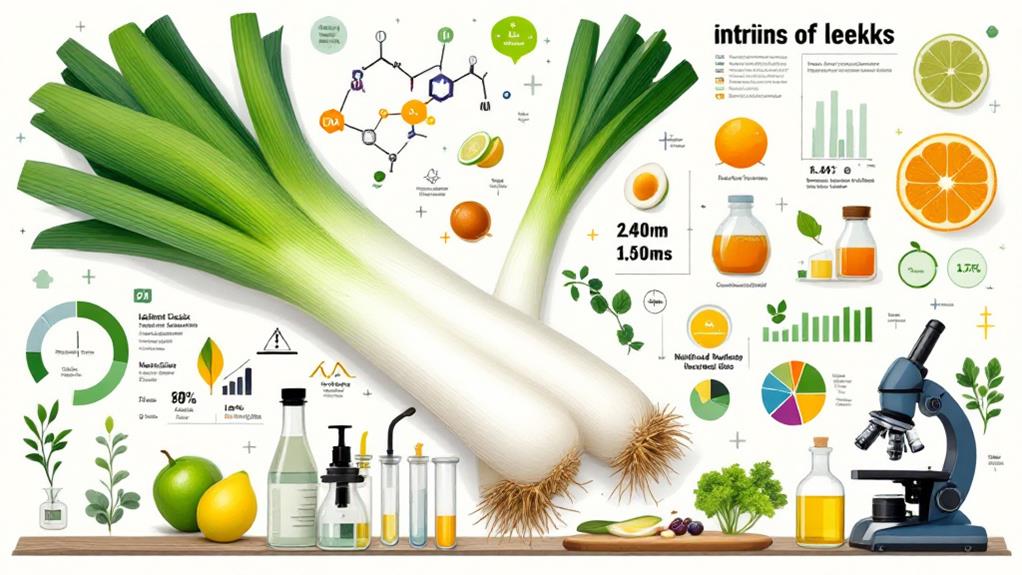
Numerous studies highlight the health benefits of leeks, particularly their role in reducing cancer risk. Research indicates that regularly consuming leeks and other allium vegetables is linked to a markedly lower risk of certain cancers. Remarkably, high allium intake corresponds with a 46% reduction in gastric cancer risk. A meta-analysis also shows a 30% lower risk of breast cancer among frequent allium vegetable consumers, emphasizing leeks' protective properties.
The antioxidants in leeks, such as kaempferol, are thought to play an essential role in these health benefits. They may inhibit cancer cell growth and reduce inflammation, contributing to leeks' anticancer effects. While animal studies suggest selenium-enriched ramps, which are related to leeks, might lower cancer rates, more research is needed to confirm these findings in humans.
Beyond cancer prevention, ongoing research is exploring the neuroprotective effects of leek compounds. There's promising evidence that these compounds might help reduce the risk of cognitive decline and neurodegenerative diseases. As research continues, the potential health benefits of leeks in fighting inflammation and protecting cognitive function could become even clearer, solidifying their status in a healthy diet.

